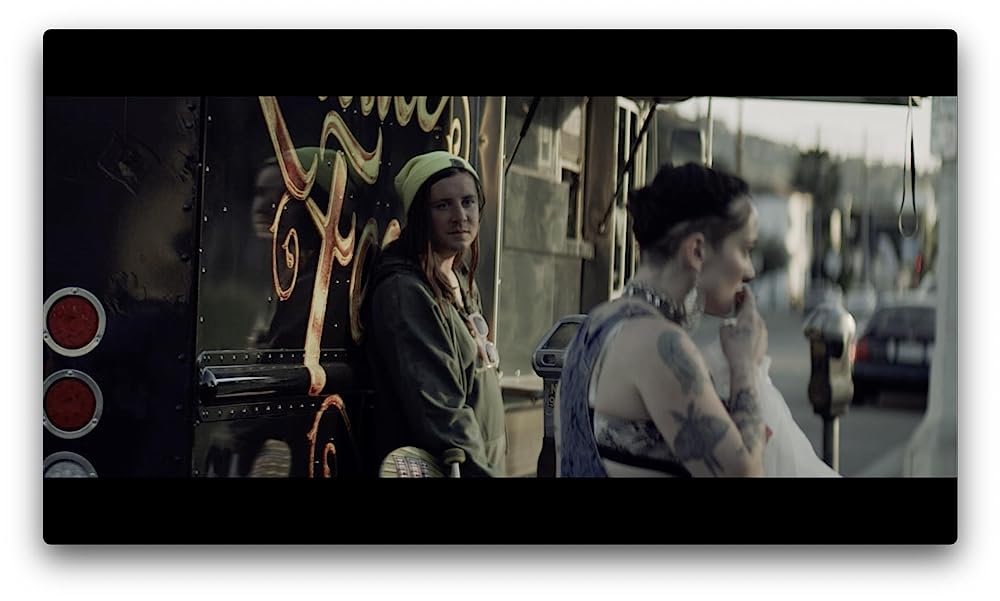Joe Bartone’s Everything Will Be Fine In The End is a surprisingly insightful character-driven dark comedy, elevated by absurdity and magical realism.
Expectation is a funny thing. Everything Will Be Fine In The End, written and directed by Joe Bartone, feels like one thing upon the opening shot, and then becomes something else entirely by the end credits. It’s darkly funny and a little bit existential, but first impressions suggest something a little less unique. It’s a testament to Bartone’s craft that the switch happens, but the film also serves as a reminder that the smaller films can often produce the biggest gems.
The film’s main character is ostensible George (Elsa Kennedy), whom we follow as she answers an ad for a home cleaner. She’s a bit adrift, still reeling from a traumatic upbringing, and blurring the pain with inadvisable sexual encounters, booze and drugs. The creator of the ad is Julia (Holly Rockwell), who suffers from OCD so severe that everything in her home is individually wrapped in thin plastic. But when she unexpectedly comes home to find George and her friends Ren (Cheska Zaide) and Kai (Steven Michael Martin) making a right old mess of the place, it leads to a decision that comes to haunt George and her friends. Quite literally.
At first, Bartone’s film feels a bit low-fi and even a little clunky. It’s a pleasant surprise, then, when the writer/director starts to sprinkle in some elements of absurdity and even some magical realism. What could have been a quite standard run-of-the-mill drama about mistakes and managing life in your twenties, is suddenly elevated by these odd flourishes. They allow for the film to become that bit more engaging and immersive than perhaps one might have, quite negatively, assumed it would be at the beginning. It’s fun and Bartone leans into the quirkiness of it, but the film is also quite poignant.

Everything Will Be Fine In The End is set in Los Angeles, but rather than the glitz and glam of Hollywood, it’s the grungier, grittier side streets littered with missing posters, rubbish and colourful side characters. It’s not a hugely important aspect of Bartone’s story, but it adds a little weight to George’s struggle to essentially find her way. People flock to the ‘City of Angels’ for stardom, for a purpose, and to chase that all important American dream. But sometimes they end up answering wanted ads in the laundromat for a bit of extra cash. George flits between moments of self-reflection and moments of self-delusion, and that feels like quite an apt description of the city she’s in, too. She’s struggling with existential angst and trauma, but also with some dubious choices and immaturity. She’s flawed and not particularly likeable, but in a way that feels realistic. Bartone is not concerned with creating a caricature, but rather someone who feels real, who feels human.
And that leads on to what is perhaps the weakest aspect of the film: Kent Harper’s Buzz. He’s the villain of the piece, but reads like a character composed entirely from a list of ‘what makes people awful’ in a way that feels a little too much. He’s the overwrought stereotype of a drug addict, drug dealer, gangster, hard man and abusive ‘boyfriend’ all rolled in to one, and it doesn’t gel with the rest of the performances. Despite the film leaning into absurdity and off-kilter humour, Buzz just feels like a bum note in an otherwise melodic film.
Everything Will Be Fine In The End is a surprisingly insightful and unique character drama. Yes it’s a bit odd, a bit grungy and a bit silly, but it feels like something that’s been crafted to be exactly that. It feels like Bartone has achieved exactly what he wanted from his cast and his quirky story. Plus, as well as being an enjoyable viewing experience, it’s also a reminder of the importance of making and seeing interesting stories like these. For they might just surprise you.
Everything Will Be Fine in the End is now available to watch on Prime Video.

